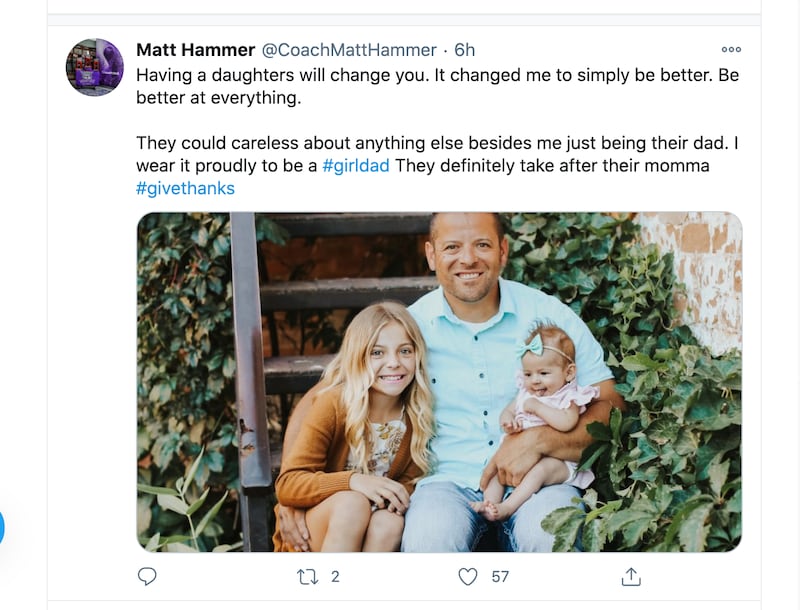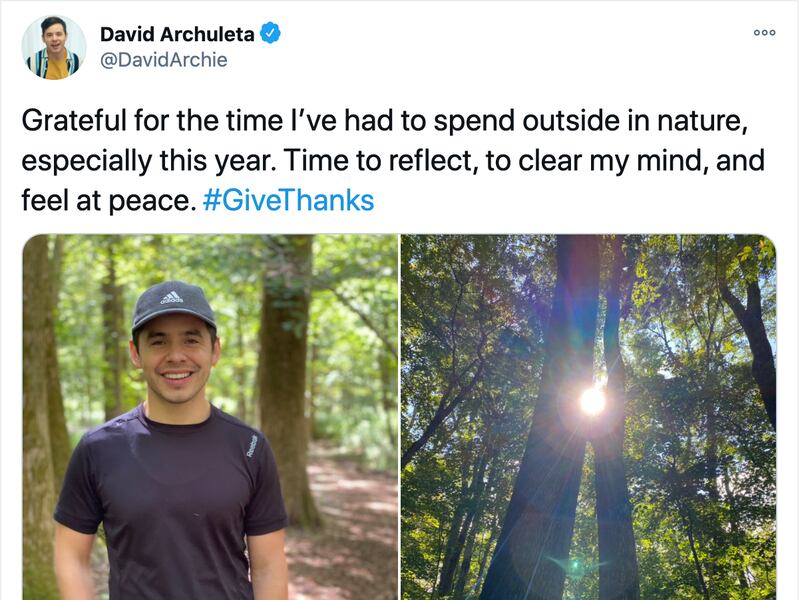Science and religion agree, gratitude increases happiness.
This year, the pandemic destabilized each of the three inborn needs we all share, experts say. First, the disease threatened our safety. Then lockdowns challenged our ability to find satisfaction, eliminating a majority of society’s normal, fulfilling activities and rewards. Finally, social isolation struck at the basic requirement for connection.
On Friday, President Russell M. Nelson, a man of science who was part of the team that pioneered open-heart surgery and a man of faith as the president of The Church of Jesus Christ of Latter-day Saints, prescribed the power of gratitude and prayer as a healing remedy for spiritual and societal problems. In a video message, he noted that researchers and faith leaders have validated gratitude’s power, and he encouraged viewers to use social media as a gratitude journal for seven days and to say a prayer of gratitude.
The Deseret News interviewed scientists and theologians to ask a fundamental question: Does gratitude really spark happiness? And, what is the connection between gratitude and what religions call the grace of God?
“Some people wonder if it’s the chicken or the egg. Is it happiness that makes us grateful or is it gratefulness that makes us happy?” said Dave Schramm, a professor and family life extension specialist at Utah State University who described the pandemic’s effects on basic needs. “The science here is pretty fascinating. It turns out that it’s the gratefulness. That’s the key to a happy life, because if we’re not grateful, no matter how much we have, we will not be happy.”
For two decades now, a steady shower of scientific studies have confirmed that gratitude has lasting positive physical and emotional effects. Grateful people sleep better, exercise more, have increased immunity against disease, live longer and enjoy greater self-respect and better relationships. Gratitude also lowers frustration, regret and resentment.
“With gratitude, people acknowledge the goodness in their lives,” according to the Harvard Medical School’s mental health newsletter. “In the process, people usually recognize that the source of that goodness lies at least partially outside themselves. As a result, gratitude also helps people connect to something larger than themselves as individuals — whether to other people, nature or a higher power.”

That is not new, according to Rabbi Lord Jonathan Sacks, who died earlier this month. Five years ago he wrote that, “What medicine now knows about individuals, Moses knew about nations.”
Gratitude had not been the Israelites’ strong suit during 40 years in the desert, Rabbi Sacks said. Moses saw their lack of thankfulness in difficult times and warned that a greater danger would be a lack of gratitude in good times. That’s why he introduced what the rabbi called a revolutionary idea, creating annual rituals to burn the nation’s history of being taken from slavery to freedom on its people’s souls. They would be reminded constantly that their existence and victories always should be credited to God.
“This is a dominant theme of Deuteronomy,” Rabbi Sacks wrote.
President Nelson noted in his video the example of Jesus Christ praying and giving thanks to God before raising Lazarus from the dead, before miraculously multiplying the loaves and fishes to feed the people, and before passing the cup to his disciples at the Last Supper. Prayer and gratitude are entwined.
The backing of science
For the past 20 years, social scientists from psychologists to family life and marriage experts have prescribed the same things Moses did millennia before: rituals or observances.

“We’re wired to actually focus on threats and negativity,” USU’s Schramm said. “We’re wired to do that, to pay attention to those, so we have to actually work extra hard to be purposeful to find the good, to feel the good and then actually to feed the good in our lives.”
On Tuesday, the world-renowned Gottman Institute published a piece on establishing rituals of connection centered on gratitude. It suggested four — send cards with a personalized message, have birthday party attendees tell the birthday person why they are thankful for him or her, create your own thank-you gift and end every night with an expression of gratitude.
These and other rituals, such as gratitude journals, are based on scientific findings. Gratitude is an emotion that makes a person feel happier, but it’s also a personality trait that can be learned through exercises, according to Psychology Today. For example, a person working to build gratitude can benefit from writing a letter to someone she never properly thanked.
The scientists themselves practice these habits and rituals.
“I tell my kids every day as they walk out the door that people are more important than problems,” Schramm said. “Gratitude ultimately is a choice and it can change our outlook on our lives. That really is what makes the difference. To learn to savor the best parts of the day in our family, we share happy thoughts. At the end of the night, we have a family prayer and then we say one thing that made us happy that day. We choose to tilt toward the good.”
That idea of choice resonates with theologians like Mark Maddix, dean of the School of Theology and Christian Ministry at Point Loma Nazarene University in San Diego.
“We know from neuroscience that the more we express gratitude, the more it becomes a part of our virtues of life,” Maddix said.
The Church of the Nazarene is an evangelical Christian denomination rooted in the teachings of John Wesley, for whom agency was a God-given gift and gratitude was grounded in the nature of our relationship to God. Wesley dedicated his prayers to gratitude on one day each week.
“Deeply embedded in the Wesleyan tradition is what we refer to as ‘the optimism of grace,’ that while we are fallen creatures, we recognize that by God’s grace we have the capacity for agency and to make choice, and God’s grace gives us that capacity to choose. That agency really is an opportunity for us to give gratitude and thanks to God and gratitude toward others,” Maddix said.

The example of Jesus Christ
Maddix turned to Paul’s teaching in Philippians 2 about Christ’s choice to leave God the Father, come to earth as a human, live among men and women and serve them, die on the cross and return to the Father. It is what Latter-day Saints call the condescension, or voluntary descent, of God, based on a Book of Mormon passage.
“When I think about gratitude, I think about the life of Jesus as a life of the servant who gives of himself for the sake of others — some would refer to it as self-emptying love, this gnosis, this giving up oneself,” Maddix said. “I have found not only in scripture but in my own life when I’m with people who are self-giving and humble, there seems to be a higher level of gratitude and thanksgiving in their life.”
The monastic tradition of Benedictine monks in Catholicism encourages allowing all things — creatures, experiences, everything — to trigger gratitude for God, said Peter Huff, chief mission officer and theology professor at Benedictine University in Illinois.
Huff noted an abiding tie between gratitude and the Catholic celebration of communion. In that ceremony commemorating the Last Supper, Catholics consume bread and wine consecrated as the body and blood of Christ.
“The early church used the Greek word Eucharist for that experience. The actual meaning of that term is Thanksgiving, so you’re really confronted with this invitation to see gratitude or Thanksgiving really at the foundation of Catholic life,” Huff said. “From our point of view, using the bread and wine of the Last Supper is an opportunity to have direct, not only spiritual but physical, contact with the Lord.”
Like the sacrament for Latter-day Saints, the Eucharist is a celebration of the redemption of Christ. The creation came with free will, Huff said, and we can and do deviate from the plan of God. Christ’s gift of redemption, or atonement, returns the fallen to the order of the creation.
“The transformation of bread and wine into the body and blood of Christ, and then the consumption of that through communion, is truly the most intimate sort of relationship you can have with Christ,” Huff said. “When we use that very ancient word Eucharist, we realize this is an act of thanksgiving itself. The challenge for all of us is to realize that should be our attitude 24/7, all of life.”
Building resilience
That attitude builds resilience, researchers say.
For example, trauma survivors say gratitude exhibited by others provides them with space to talk and heal, according to research professor and author Brené Brown. Some people worry that sharing gratitude may seem insensitive to the losses of others, but that’s wrongheaded, Brown said in “The Call to Courage.” For example, those who have lost children say they do not want to open up to someone who isn’t willing to express gratitude for their living children.
The reason is that survivors know that those who are grateful for what they have will better understand the magnitude of what a survivor has lost.
Schramm said he loves all of the Facebook, Instagram and Twitter posts he’s seeing right now as people follow President Nelson’s challenge. The posts that are vulnerable resonate the most.
“It is about those things that are irreplaceable,” Schramm said. “It’s family. It’s friends. It’s the Savior. It’s temples. It’s ‘my missionary.’”

It’s not about what social media is often derided for, comparison.
“Comparison is the thief of joy,” Schramm said, quoting Theodore Roosevelt.
In “The Call to Courage,” Brown said vulnerability and gratitude are keys to joy: “When we lose our capacity for vulnerability, joy becomes foreboding. It becomes scary to let ourselves feel it. People who have the ability to lean fully into joy share one thing in common, gratitude.”
Robert Emmons, a preeminent researcher on thankfulness, a leading proponent of gratitude journals because of what he has learned. He and others have encouraged using such journals for even longer periods, 21 to 70 days. Others keep a gratitude jar, where they place flashes of gratitude written on slips of paper.
Modern research shows that gratitude is a sixth component to emotional resilience that helps people to fight negative rumination, to accept their situation even when it may be harsh, to focus on solutions and to sustain relationships, according to a summary of research published this year by Madhuleena Roy Chowdhury at PositivePsychology.com.
People naturally tend to focus on obstacles and difficulties because they demand action. Practicing gratitude is the best way to remember what provides us courage to move ahead., according to a paper by psychologists Shai Davidai and Thomas Gilovich.
One note of caution. Those with complex mental health challenges like anxiety, depression and PTSD should seek professional therapy. Gratitude can help, but a new survey of gratitude research found that some gratitude interventions didn’t help participants feel less anxious or depressed. The lead researcher, however, said he was “very pro-gratitude,” adding, “There is a great deal of evidence that individuals who are higher in the trait of gratitude have flourishing lives.”
We actually can help build gratitude in others by the way we approach helping them, according to a review of studies on the impact of gratitude journals. In fact, helpers feel more appreciated when they helped after being asked and the people being helped feel better when they get the help they ask for. So, someone who sees someone struggling could improve the way they provide aid by first asking, “Do you need help?” or “How can I help you?”
Power of prayer
Numerous studies also have found the benefits of prayers of gratitude, as President Nelson invited people to offer.
“We know that everything goes back to God and the gift from God,” said Huff, the Catholic theologian. “So, we can’t take credit for any of it, and that’s why, eventually, we fall to the posture of prayer on knees, and we realize that everything is a gift from God and everything we do and say has to be really a life of gratitude.”
Rabbi Sacks wrote that Jewish prayer is an ongoing seminar of gratitude. Morning prayers begin each day with a list of thanksgiving for life itself. He noted that in another prayer, the Amidah, the only time the congregation responds differently is a point where they say, “We give thanks.” Rabbi Sacks said a 17th-century rabbi explained “that when it comes to saying thank you, we cannot delegate this away to someone else to do it on our behalf. Thanks has to come directly from us.”
Thanksgiving protects both people and societies from resentments and the arrogance of power, Rabbi Sacks concluded.
“It reminds us of how dependent we are on others and on a Force greater than ourselves. As with individuals so with nations: thanksgiving is essential to happiness and health.”


